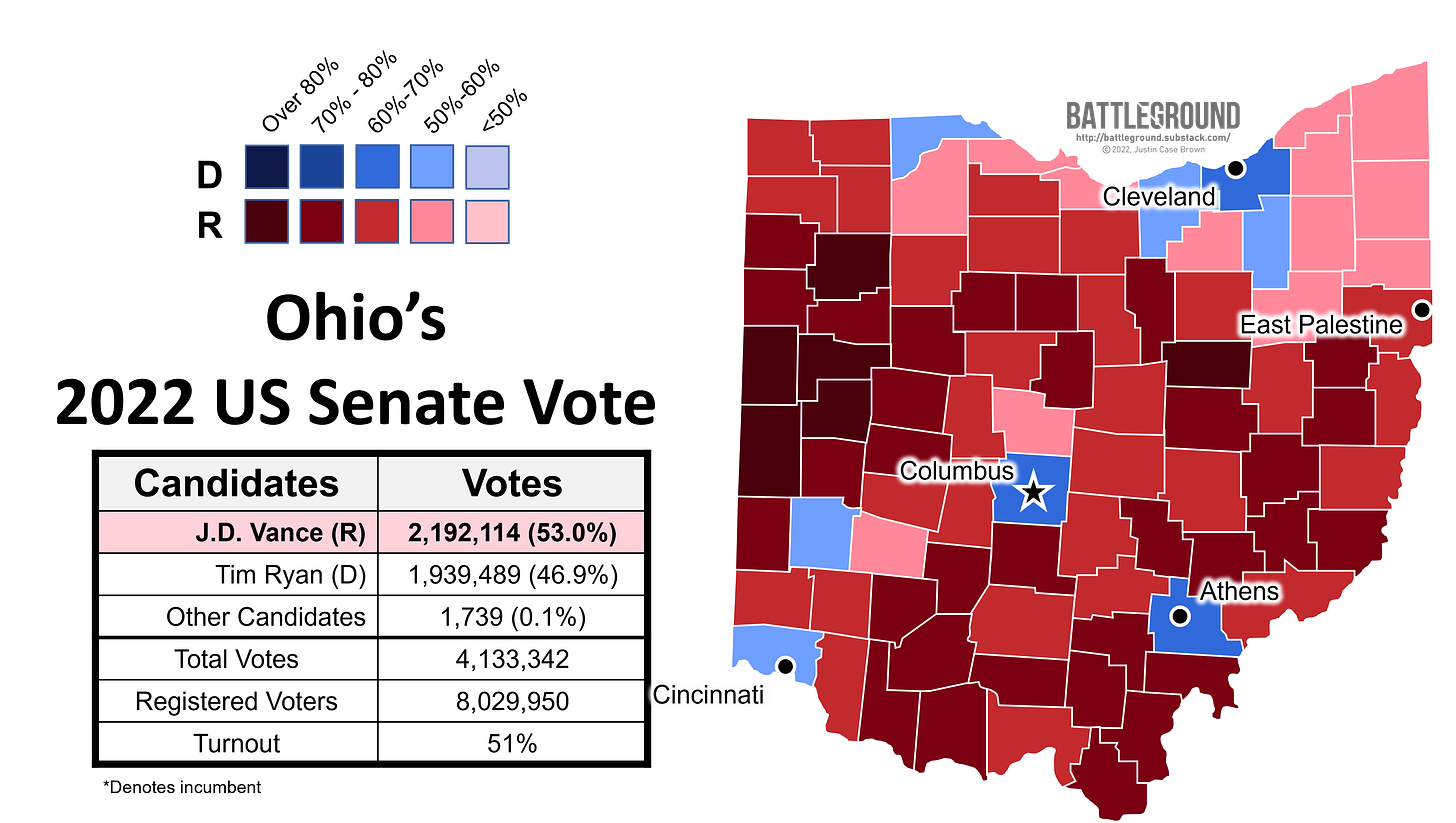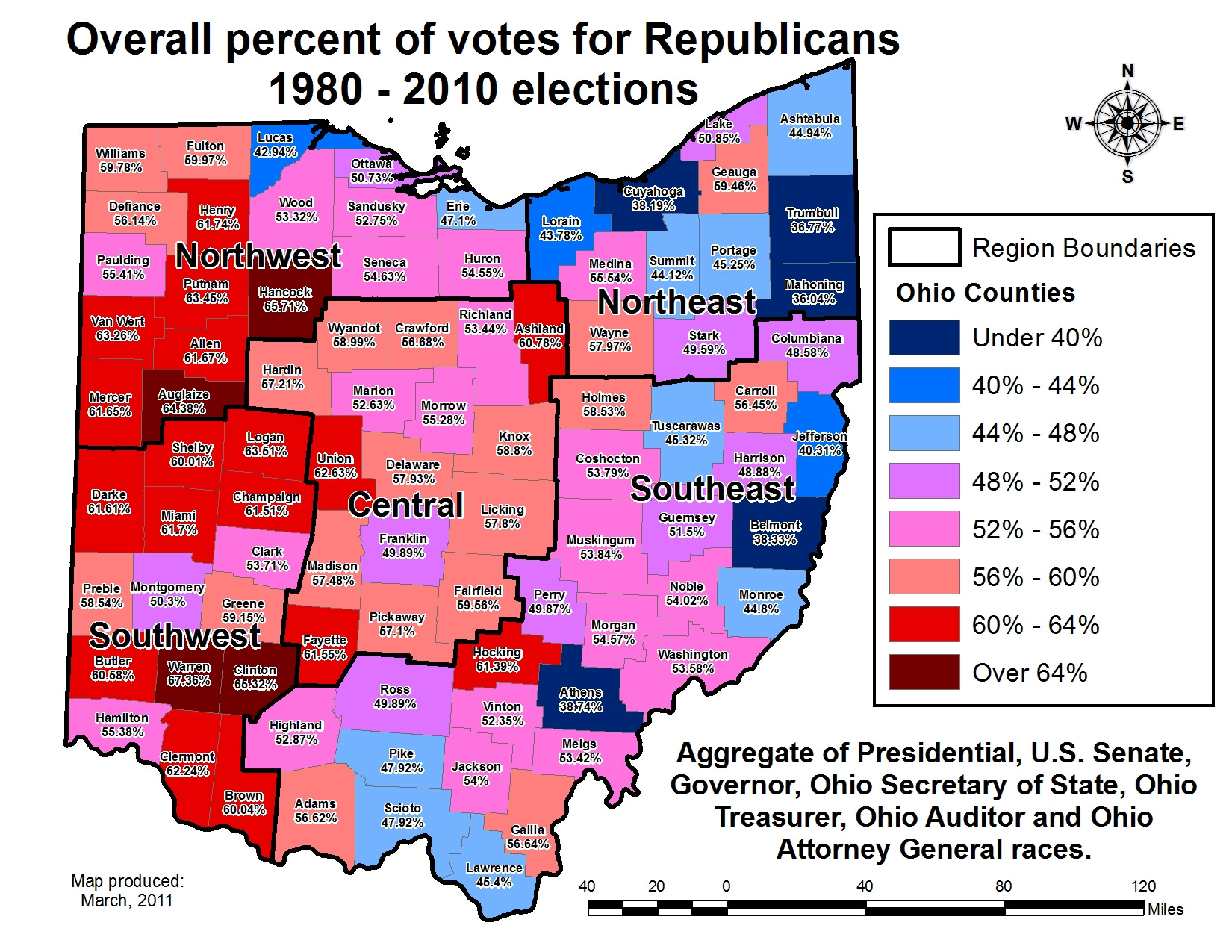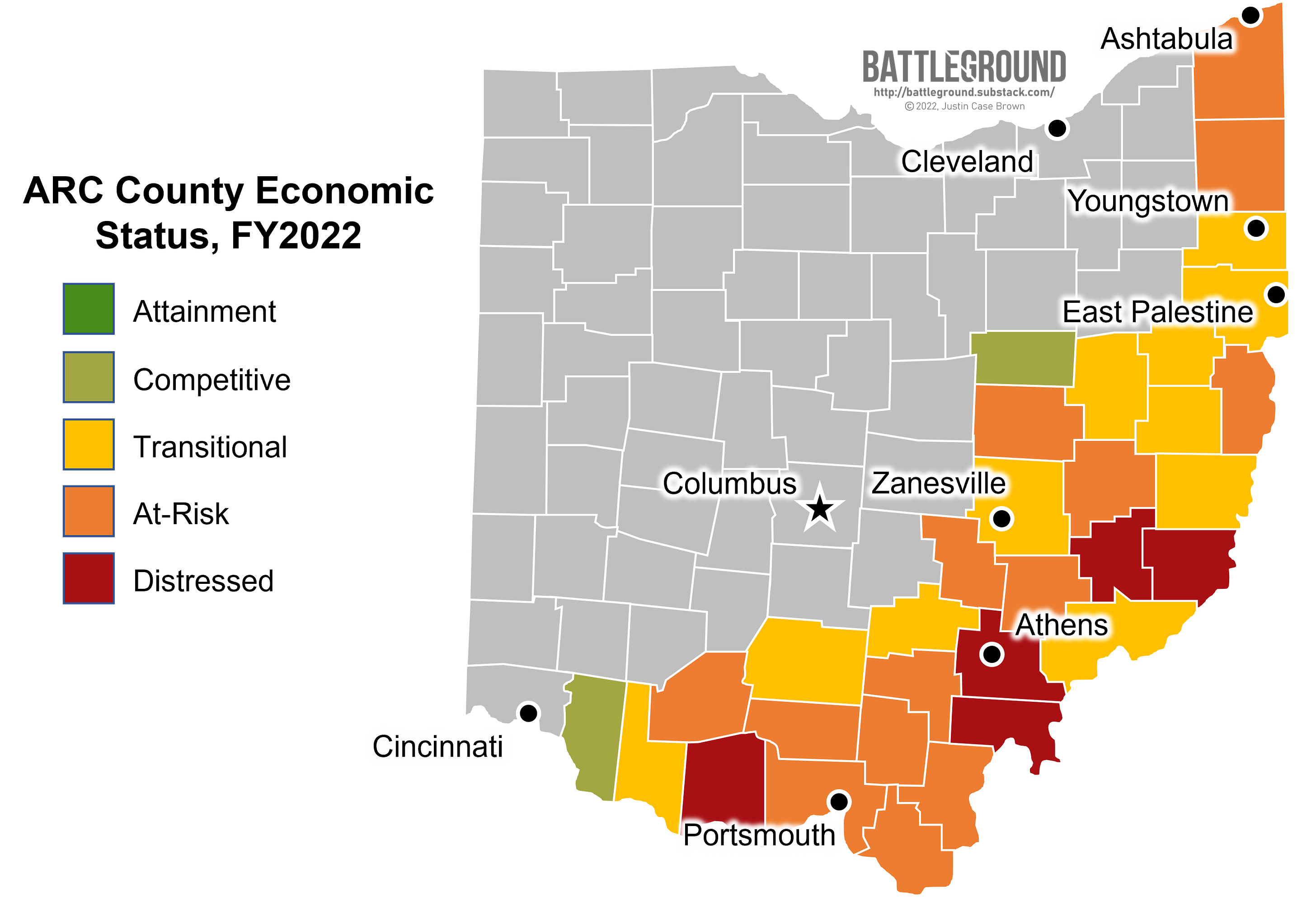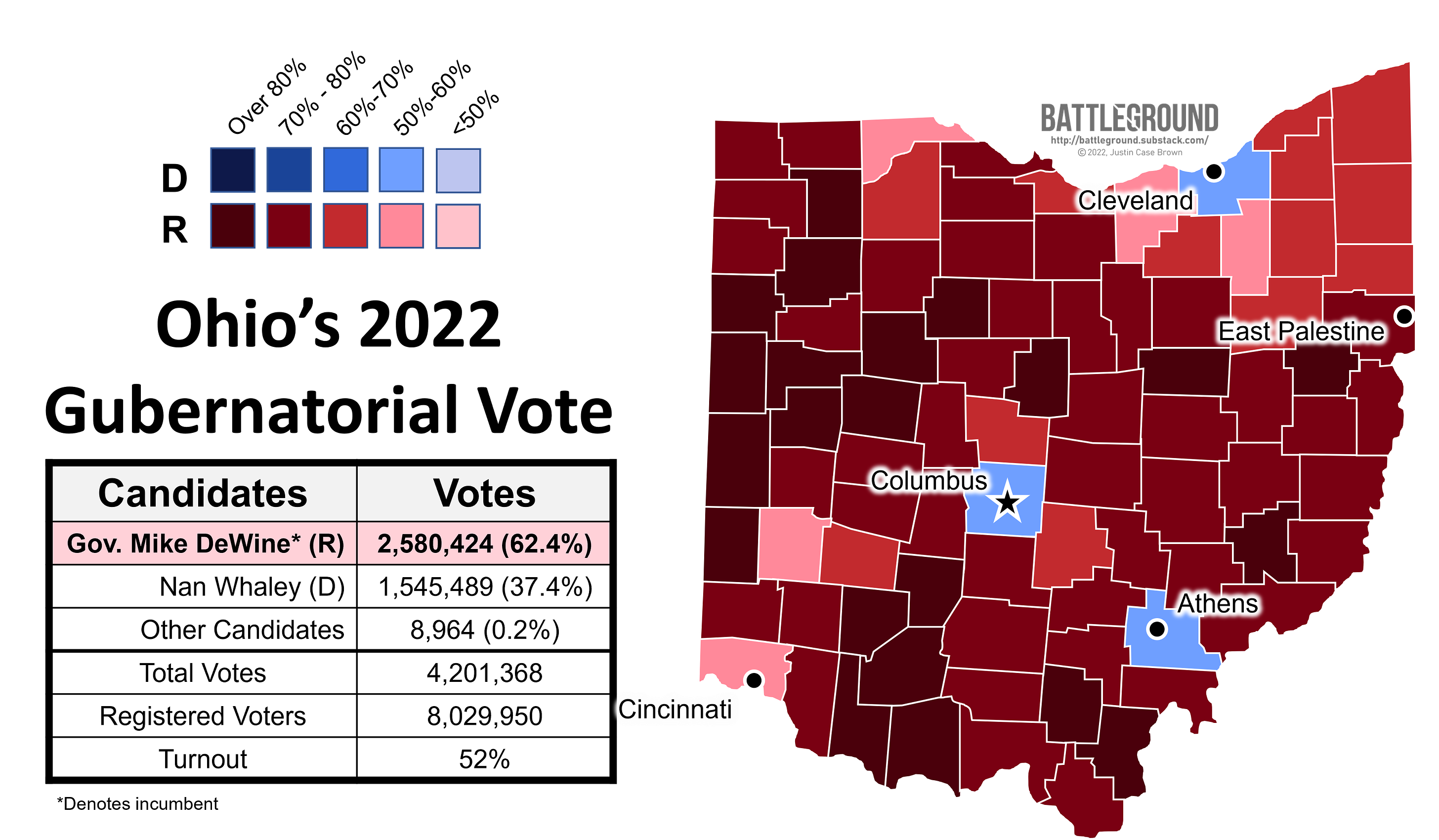Battleground - Ohio's Slow Coal Trainwreck
Battleground is a reader-supported publication. Consider supporting the newsletter through Buy Me A Coffee. Ohio's Slow Coal TrainwreckRecent electoral successes in Appalachian Ohio hide the Republican Party's failure to improve conditions in the state's poorest counties.Topline Takeaways
Ohio: The 20th Century BellwetherThroughout the 20th century, Ohio was considered the quintessential bellwether state. Between 1964 and 2016 the state literally did not miss: it voted for the presidential winner in every election during that time frame. It was considered a pivotal swing state in politics in part due to its diverse geography. It held flat farmland resembling the heartland West, several major cities resembling the metropolitan East Coast and a mountainous region following the path of the Ohio River that leaned into Appalachian culture. What kept the state politically balanced was the presence of Appalachian Democrats. These Democratic voters acted as a counterweight to the Republican strongholds in the western regions of the state. These were “Blue Dog” Democrats that tied their support for the area’s coal industry to their support for worker protections and unions. However, the coal industry entered its slow demise starting in the 1980s just as research was emerging proving the disastrous effects of burning coal for energy. As the national Democratic party pivoted toward environmentalism in the early 2000s, it sparked a slow political realignment that eroded statewide prospects for Democrats in the early 21st century.
Appalachian Ohio In The 21st CenturyThe decline of Ohio’s coal industry has economically ruined Appalachian Ohio. The region was once home to stable, well-paying jobs facilitating coal mine operations or working in one of the region’s many coal-fired power plants. The emergence of cheaper energy alternatives like natural gas, solar and wind energy has eroded the demand for coal, causing much of the state’s coal industry to shut power plants and abandon mining sites. This has led to acute poverty across Appalachian Ohio as the industry was the sole major employer in many towns across the region. The Appalachian Regional Commission (ARC), formed in 1965, is tasked with aiding development throughout portions of 13 states that comprise the Appalachian region as this region has historically lagged behind the rest of the US in economic development. (In Ohio, 32 counties are under ARC’s jurisdiction, shown on the map below.) ARC gives each county one of five possible economic designations based on three primary indicators: the three year average unemployment rate, market income per capita and the poverty rate. ARC’s county economic ratings help illustrate the persistent distress of residents in Appalachian Ohio. None of the state’s Appalachian counties have earned the top “attainment” rating in the last ten years and five counties were given the lowest rating of “distressed” in the most recent update for FY 2022. (Despite near Republican dominance in state politics, most counties have not seen improvements in their economic status ratings over the past decade.) Republicans saw the region’s economic distress as a political opportunity and immediately recast Democrats’ commitment to environmentalism as a “War on Coal”. Throughout the 2010s, Republicans figuratively parachuted into the distressed region, promising to bring coal back to its glory days. Donald Trump fervently campaigned on this promise despite clear economic indicators that this was in fact impossible. Appalachian Ohioans didn’t care about the facts: they flipped in favor of Republicans by large margins in recent years, cementing Republican dominance in the state. Today Republicans hold all statewide offices, super-majorities in both houses of the state legislature and outnumber Democrats by a margin of 2-to-1 in the Ohio delegation to the US House. They’ve shown that they’re adept at transforming political grievance into votes, yet haven’t delivered on their promises through governance as their actions show a commitment to coal corporations, not the average Ohio voter. Former coal workers in Appalachian towns are still struggling with few job prospects and mounting health issues while energy companies receive bailouts. Ohio Republicans’ Commitment to Coal Corporations, Not WorkersDespite the fact that Republicans hold nearly unchecked power in Ohio, they’ve proven unable to stand up for the voters that put them in office. Their governance style is instead driven largely by corporate interests and corruption. To start, they’ve utterly failed to revitalize the coal industry: more coal plant capacity disappeared during Trump’s first two years in office than during President Barack Obama’s entire first term. When beginning the closure of coal mines, companies are supposed to be held liable for reclamation: return the land to its natural state. However, since these companies are often shutting down plants and mines due to bankruptcy, they often avoid this liability via a complex web of bankruptcy laws. -Josh Macey co-author of the Stanford Law Review article "Bankruptcy as Bailout." Despite the fact that these major corporations fail on reclamation efforts, Ohio Republicans regularly avoid providing much needed funding to the state’s coal reclamation fund: a pool of money set aside explicitly to fund reclamation efforts when corporations shirk their responsibilities. (This wasn’t the first time Republicans ‘defunded’ these efforts…) This decision quickly came back to bite them: months later one of the state’s largest mining companies filed for bankruptcy, proving the need for funds that Republicans had just voted against. Then there’s the FirstEnergy bribery scandal. The energy company bribed several Ohio state lawmakers, including the Republican House Speaker Larry Householder to the tune of $60 million. This money was used to push through a bill that simultaneously increased electricity rates for Ohioans, subsidized coal-fire power plants and reduced incentives for renewable energy. In total, the bill amounted to a $1.3 billion bailout for the energy company. What’s sad is that Appalachian Ohio voters aren’t showing a willingness to return to the Democratic party for relief from Republican incompetency. Instead, Republicans are effectively directing voters’ grievances into hatred toward already marginalized groups like immigrants, racial minorities and the LGBTQ community. (…an unfortunately predictable pattern for some of the whitest places in the nation.) Leftover Links
|
Older messages
Florida is a red state. Get used to it.
Tuesday, February 21, 2023
Ron DeSantis's political transformation of Florida cannot be understated or ignored.
Wisconsin: How Conservative Talk Radio Weaponizes Whiteness
Monday, February 13, 2023
Racism may have compelled split-ticket voters to show up for both Sen. Ron Johnson (R) and Gov. Tony Evers (D).
Mississippi Democrats Have Suspicious Minds
Monday, February 6, 2023
Elvis Presley's cousin? That's who you're getting behind...?
"MAGA-Lite" Finds A Home In Utah
Monday, January 30, 2023
While Utahns have finally hopped on the Trump train, they're still skeptical of the extremists on board.
Kansas Inches Closer to Swing State Status
Monday, January 23, 2023
When a Democratic governor gets re-elected in a state that Donald Trump won twice,
You Might Also Like
AI chatbots keep failing every accuracy test thrown at them
Wednesday, March 12, 2025
PLUS: Why Substack's new subscriber milestone is so significant ͏ ͏ ͏ ͏ ͏ ͏ ͏ ͏ ͏ ͏ ͏ ͏ ͏ ͏ ͏ ͏ ͏ ͏ ͏ ͏ ͏ ͏ ͏ ͏ ͏ ͏ ͏ ͏ ͏ ͏ ͏ ͏ ͏ ͏ ͏ ͏ ͏ ͏ ͏ ͏ ͏ ͏ ͏ ͏ ͏ ͏ ͏ ͏ ͏ ͏ ͏ ͏ ͏ ͏ ͏ ͏ ͏ ͏ ͏ ͏ ͏ ͏ ͏ ͏ ͏ ͏ ͏
Everything We’ve Written About That’s on Sale at Nordstrom
Wednesday, March 12, 2025
Plus: Actually cute plus-size maternity clothes. The Strategist Every product is independently selected by editors. If you buy something through our links, New York may earn an affiliate commission.
What A Day: Bad Car-ma
Tuesday, March 11, 2025
Elon Musk's politics are sparking a major Tesla backlash, ironically thanks to Trump. ͏ ͏ ͏ ͏ ͏ ͏ ͏ ͏ ͏ ͏ ͏ ͏ ͏ ͏ ͏ ͏ ͏ ͏ ͏ ͏ ͏ ͏ ͏ ͏ ͏ ͏ ͏ ͏ ͏ ͏ ͏ ͏ ͏ ͏ ͏ ͏ ͏ ͏ ͏ ͏ ͏ ͏ ͏ ͏ ͏ ͏ ͏ ͏ ͏ ͏ ͏ ͏ ͏ ͏ ͏ ͏
Rohingya refugees just lost half of their food aid. Now what?
Tuesday, March 11, 2025
An interview with Free Rohingya Coalition what happened last week in Asia, Africa and the Americas Hey, this is Sham Jaff, a freelance journalist focused on Asia, Africa and the Americas and your very
Shayne Coplan’s Big Bet Is Paying Off
Tuesday, March 11, 2025
March 11, 2025 THE MONEY GAME Shayne Coplan's Big Bet Is Paying Off By Jen Wieczner Photo: Dina Litovsky At 6 am on Wednesday, November 13, eight FBI agents in black windbreakers burst through the
We need your input.
Tuesday, March 11, 2025
Share your insights & receive a 70% off forever.
We Talkin’ About Practice?
Tuesday, March 11, 2025
Nobody Told Me There'd Be Days Like These ͏ ͏ ͏ ͏ ͏ ͏ ͏ ͏ ͏ ͏ ͏ ͏ ͏ ͏ ͏ ͏ ͏ ͏ ͏ ͏ ͏ ͏ ͏ ͏ ͏ ͏ ͏ ͏ ͏ ͏ ͏ ͏ ͏ ͏ ͏ ͏ ͏ ͏ ͏ ͏ ͏ ͏ ͏ ͏ ͏ ͏ ͏ ͏ ͏ ͏ ͏ ͏ ͏ ͏ ͏ ͏ ͏ ͏ ͏ ͏ ͏ ͏ ͏ ͏ ͏ ͏ ͏ ͏ ͏ ͏ ͏ ͏ ͏ ͏ ͏ ͏ ͏ ͏
Seattle startup takes eco-friendly aim at recycling clothing
Tuesday, March 11, 2025
Read AI rolls out enterprise search tool | Hard time for hardware ADVERTISEMENT GeekWire SPONSOR MESSAGE: A limited number of table sponsorships are available at the 2025 GeekWire Awards: Secure your
☕ The beauty of it all
Tuesday, March 11, 2025
A conversation with Ulta Beauty's CMO. March 11, 2025 View Online | Sign Up Marketing Brew Presented By Iterable It's Tuesday. Count Kathy Hochul as an ad buyer. The governor of New York is
🤔 What’s in your wallet? A scam.
Tuesday, March 11, 2025
Plus, a new streaming deal is the latest gift to Trump from the billionaire CEO and his company — which profits off government contracts. Forward this email to others so they can sign up 🔥 Today on




